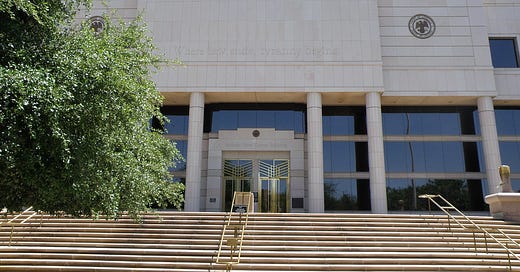Arizona taxpayers bear $1.5 million cost defending popular Prop 211 law
Prop 211 was popular with voters, so why are taxpayers footing the bill to overturn that same law?
Arizona's Proposition 211, a pivotal constitutional amendment designed to enhance transparency in political campaign financing, remains under persistent legal challenge from state Republicans, despite being upheld by multiple courts and enjoying strong voter support.
The ongoing legal struggle has already cost taxpayers over $1.5 million, based on records from the Arizona Legislature and the Arizona Citizens Clean Elections Commission.
Prop 211, also known as the "Voters' Right to Know Act," was overwhelmingly approved by 72% of voters in the 2022 general election. The measure requires groups spending over $50,000 on statewide campaigns or $25,000 on other campaigns to disclose the original sources of contributions exceeding $5,000. This initiative aims to reduce the influence of "dark money" in Arizona's elections, ensuring voters know who is funding political campaigns.
Since its passage, Republican lawmakers and conservative groups have launched numerous legal challenges against Prop 211, claiming it infringes on First Amendment rights and could suppress free speech. However, every court, both state and federal, has so far rejected these arguments, upholding the law supported by a significant majority of Arizona voters.
Securing 72% approval is a remarkable feat, yet this consensus is seemingly disregarded by those who benefit from undisclosed political spending.
It appears likely that the case will reach the Arizona Supreme Court or even the U.S. Supreme Court1, further increasing the financial burden on taxpayers, who overwhelmingly approved this measure two years ago.
Indeed, the cost to taxpayers is already substantial. Legal fees and associated costs have exceeded $1.5 million, a figure expected to rise as the case continues. This expenditure comes at a time when the state faces other pressing financial needs, including education and healthcare funding, amidst a billion-dollar shortfall requiring significant budget cuts before the June 30 fiscal deadline.
Here is a monthly breakdown of the expenses for the Toma v. Fontes case:
The Arizona Legislature hired Snell & Wilmer for representation, with invoices as follows:
July 2023: $18,407
August 2023: $63,509.42
September 2023: $41,122.74
October 2023: $111,888.42
November 2023: $126,504.83
December 2023: $188,505.92
January 2024: $150,896.15
February 2024: $91,923.50
March 2024: $78,399.90
April 2024: $29,473.85
Totaling $900,631.73.
The Clean Elections Commission, represented by Osborn Maledon, incurred the following expenses:
August 2023: $25,686.60
September 2023: $29,020.05
October 2023: $29,216.95
November 2023: $31,291.00
December 2023: $26,228.00
January 2024: $49,501.00
February 2024: $80,378.50
March 2024: $15,751.00
Totaling $259,073.10.
Additionally, defending the law in federal court against Goldwater-backed Americans For Prosperity has added another $358,851.41, bringing the total from taxpayers to $1,518,556.24.
With legal battles far from over, these numbers are expected to climb. The invoices cover up to April 30, 2024, for the Legislature and March 31, 2024, for Clean Elections, leaving three invoices2 unaccounted for as of June 6, 2024.
Amid a budget shortfall and rising inflation costs, I can think of at least one better use for your money:
There are multiple lawsuits, one working through state courts and another through federal.
May 2024 from the Legislature and April and May 2024 from Clean Elections





Re: “Arizona's Proposition 211, a pivotal constitutional amendment designed to enhance transparency in political campaign financing,…” That’s not right,
is it? Proposition 211 was statutory, wasn’t it?
Re: “Securing 72% approval is a remarkable feat, yet this consensus is seemingly disregarded by those who benefit from undisclosed political spending.”
To paraphrase George Will, some things are beyond the reach of majorities. If something is unconstitutional, its popularity should have no bearing on whether it’s upheld. Lots of famous SCOTUS cases overturned practices that some folks really liked!
So Chat GPT is sexist and racist unless one explicitly demands a “diverse” image…